SLC22-W6/ LABOR LAW
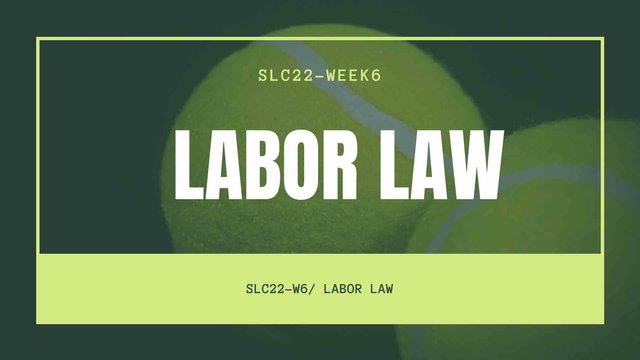
Based on what you have seen in class, tell us whether in your country work is considered a "duty" in addition to being a right, and whether there is any legal sanction for those who do not fulfill this duty.
In Pakistan labour holds equal roles as both an entitlement and a responsibility that our culture values. Pakistan's Constitution demands through Article 37e that government improve the social justice and economic lives of all citizens allowing them to work with dignity.
Beyond legal requirements there are no mandatory penalties when someone decides not to work. People have freedom to choose what they do about employment and the government directs resources toward job creation.
Our goal is to enable people access to both social participation and personal self-sufficiency. People value work because it leads them toward independence and helps them live peacefully in society. No one must work because Pakistani law lets individuals choose their path and activities without punishment.
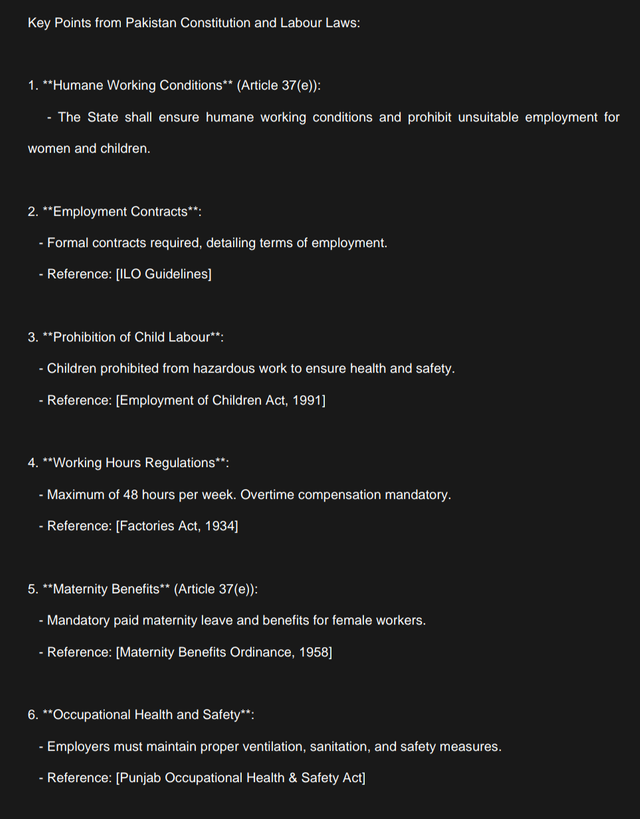 |
|---|
The nation of Pakistan considers work first as a means for personal improvement and nation building but secondly allows people the freedom to make their own choices. Our social and legal thought shows respect for human values by keeping work and personal needs in harmony.
State which law in your country is responsible for protecting labor rights or work rights and what do you think about that law.
In Pakistan two main laws called IRA and Employment of Labour (Standing Orders) Ordinance 1968 protect workers' rights and control how people interact at work. The laws protect all business sectors by guaranteeing fair workplace treatment and minimum wage payments with guarded employment places.
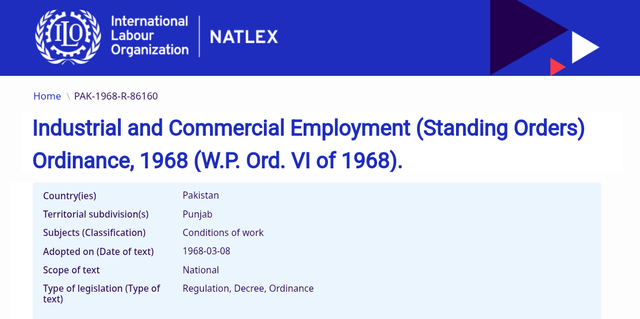 |
|---|
I endorse these legal changes because they move us forward. They want to establish an equal agreement between what employees need and what employers must do. Under Article 37(e) of Pakistan's Constitution the government strives to offer decent working standards to employees. The real difficulty in law enforcement appears at every stage of implementing official policies.
The system to protect workers performs its purpose but needs better ways to enforce the rules. The law should shield workers from harm and organizations must enforce it better to help people at work.
Part II
Based on what you saw in class, say which institutions are responsible for or competent to enforce labor rights.
In Pakistan multiple official bodies are assigned to implement labor rights protection laws. When workers face wage and employment problems Labour Courts serve as a platform for justice.
Labour Departments at federal and provincial offices conduct workplace exams and check compliance with labor rules while resolving worker complaints. They work to protect the safety and legal requirements of workplaces.
Through the National Industrial Relations Commission NIRC workers receive help with disputes related to trade unions and rights. These government authorities effectively protect labor rights but they need consistent monitoring and worker education to do their job well.
State whether you have had an experience in the workplace in which the claim or violation of any labor right or employment right is applicable.
A labor right issue happened in my working experience. Let me explain. My direct workmate had problems with working extra hours without receiving wage compensation. Under labor rights all workers must receive fair pay for their overtime work.
You know what? It affected more than her paycheck because my colleague wanted her work treated with equal value. Everyone deserves fair respect during their time at work. My understanding tells me that employees should get their proper due.
Through this incident I learned you need to understand the rights workplaces owe you. When workers understand their rights they have the power to defend their own treatment at work.
This lesson demonstrated that workers who fight back against workplace law breaches can push companies toward better behavior.
Part III
Case Study 1.
A company needs two drivers, but the company's financial situation has been deteriorating and they need to reduce operating costs, including paying their employees.
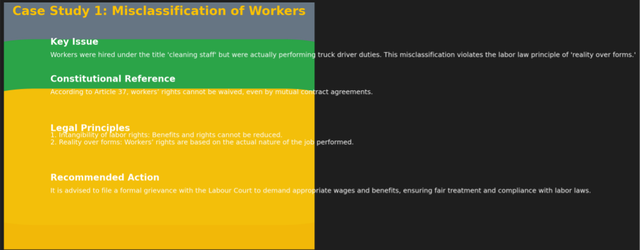 |
|---|
To help these workers I will explain my recommended strategy for their legal case. Under labor rights law basic rights remain in place no matter what working arrangements employees agree to.
You know what is interesting here? The real work these employees perform stands above their job classification. The workers' driving duties take priority over what their contracts label them as cleaning staff members.
The basic worker benefits fall under the traditional principle of "pace of progress and unbreakable labor rights". Under labor law employers cannot decrease or eliminate these benefits no matter what the employment contract states.
Under basic labor law rules the employer must adhere to these basic worker protections. Workers should not follow unjust contract terms and they need fair payment plus workplace benefits for their real job duties.
Case Study 2.
A worker has been working for a company for 15 years, but his relationship with his boss has been getting worse due to personal issues between them. One day, the boss decides to fire him, claiming that it is his company and that he admits whoever he wants. Without further ado, the worker decides to seek advice.
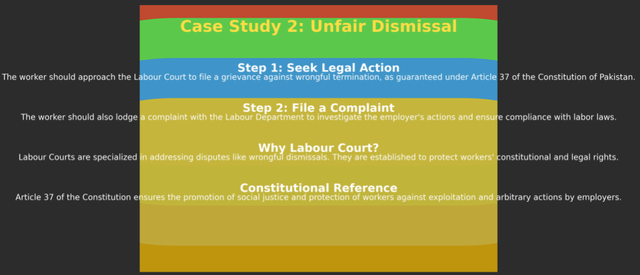 |
|---|
- Let me explain. Under Pakistani law this employee needs to turn to the Labour Court for help with the illegal discharge. The law defends employees from unfair job dismissals which appears to be violated here. The worker should start by filing a grievance at the Labour Court because it offers him job reinstatement options or compensation.
A worker should send information about their dismissal to the Labour Department for a formal investigation. You know what? Department officials will examine company activities to verify no labor regulations were broken when the worker got fired.
- The Labour Court holds this authority because it resolves specific cases of incorrect firing. Our court system was created to defend workers' legal rights and maintain employer compliance with legal requirements.
The institution protects fairness because employers keep dismissing workers improperly and employers must follow the rules. Through these actions the labor court protects his employment rights while making sure companies follow official rules.
kind Regards
@artist1111

Adieu, folks!
May the winds of fortune
carry you to greatness!
May the winds of fortune
carry you to greatness!